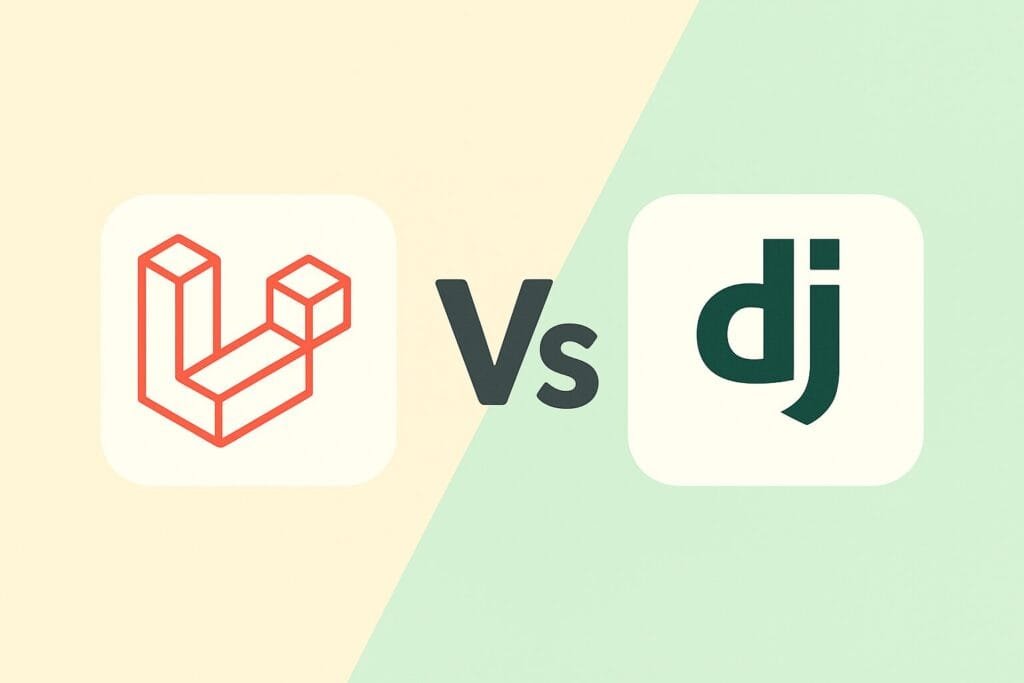When it comes to choosing the best framework for web development, two popular names often dominate the discussion: Laravel and Django. Both frameworks are widely used by developers across the globe, offering powerful features, robust security, and flexibility for building scalable applications. However, the question remains: Laravel vs Django, which one truly wins for web development? In this article, we will dive deep into their differences, strengths, weaknesses, and use cases to help you make the right choice.
What is Laravel?
Laravel is a PHP-based web framework that follows the Model-View-Controller (MVC) architecture. Known for its elegant syntax and ease of use, Laravel helps developers create web applications quickly with less repetitive code. It comes with built-in tools like routing, authentication, caching, and task scheduling. Laravel also integrates smoothly with front-end tools, making it an excellent choice for full-stack development.

What is Django?
Django is a Python-based web framework that also follows the MVC (or MTV – Model Template View) architecture. It is designed for rapid development with a strong focus on security, scalability, and clean code. Django is often chosen by data-heavy applications, startups, and large-scale enterprises that rely on Python for data science, machine learning, or AI integration.
Key Differences Between Laravel and Django
While both frameworks aim to speed up development, they differ in programming language, performance, ecosystem, and learning curve. Below is a detailed comparison:
| Feature | Laravel | Django |
|---|---|---|
| Programming Language | PHP | Python |
| Learning Curve | Easy for beginners, especially those with PHP background | Moderate, best for Python developers |
| Performance | Good, but can be slower compared to Django under heavy loads | High performance, optimized for large-scale applications |
| Community Support | Very active PHP community, large ecosystem | Strong Python community, extensive documentation |
| Security | Strong security features, requires manual configuration for advanced security | Excellent security features by default, protects against SQL injection, XSS, CSRF |
| Best Use Cases | E-commerce, CMS, SaaS applications | AI-driven apps, data-heavy platforms, enterprise solutions |
When to Choose Laravel?
Laravel is the right choice if:
- You are familiar with PHP and prefer rapid development with simple syntax.
- You are building small to medium-sized web applications such as e-commerce or CMS platforms.
- You want to leverage Blade templating engine and integrations with front-end tools.
- You are looking for a cost-effective solution with vast hosting support (since most web hosts support PHP).
When to Choose Django?
Django is the right choice if:
- You are a Python developer or plan to integrate your application with data science or machine learning tools.
- You are developing enterprise-level or large-scale applications that require high performance.
- You prioritize security and want features like CSRF, SQL injection, and XSS protection out of the box.
- You are building apps that rely on heavy data processing, such as healthcare platforms, fintech solutions, or social networks.
Laravel vs Django: Which One Wins?
The winner between Laravel and Django depends on your project requirements. Laravel is an excellent choice for developers who want flexibility, ease of use, and cost-effective hosting solutions. Django, on the other hand, is ideal for projects that require scalability, high security, and data-driven capabilities. In short:
- Laravel wins for web apps focused on fast development, customization, and ease of hosting.
- Django wins for enterprise-level, secure, and data-heavy applications.
Conclusion
Both Laravel and Django are powerful frameworks, but your choice should be based on your programming language preference, project goals, and scalability needs. If your team is proficient in PHP and you need a quick solution, Laravel is a solid option. If you are building data-heavy applications and value Python’s ecosystem, Django should be your go-to framework.
For more insights on modern frameworks and developer guides, you can check out GeeksforGeeks for tutorials and best practices.

